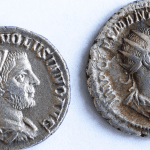
Our title this week is The Beginning of Birth Pains, and our reading this week is from the gospel of Mark:
As Jesus was leaving the temple, one of his disciples said to him, “Look, Teacher! What massive stones! What magnificent buildings!” “Do you see all these great buildings?” replied Jesus. “Not one stone here will be left on another; every one will be thrown down.”
Welcome Readers! Please subscribe to Social Jesus Here.
As Jesus was sitting on the Mount of Olives opposite the temple, Peter, James, John and Andrew asked him privately, “Tell us, when will these things happen? And what will be the sign that they are all about to be fulfilled?”
Jesus said to them: “Watch out that no one deceives you. Many will come in my name, claiming, ‘I am he,’ and will deceive many. When you hear of wars and rumors of wars, do not be alarmed. Such things must happen, but the end is still to come. Nation will rise against nation, and kingdom against kingdom. There will be earthquakes in various places, and famines. These are the beginning of birth pains.” (Mark 13:1-8)
Jesus was more than a religious figure. When we characterize Jesus purely as a religious figure, we back ourselves into a corner where our interpretations can do harm. Let me explain.
The gospels repeatedly represent Jesus in the narratives as being against the Temple. As Richard Horsley writes, “The Gospels and the materials they incorporate portray Jesus as adamantly opposed to the high priests and the Temple and portray the high priests and scribal-Pharisaic representatives of the temple-state as eager to destroy Jesus” (In Jesus and the Politics of Roman Palestine, p. 48).
A few examples from the gospels are:
“Then the chief priests, the teachers of the law and the elders looked for a way to arrest him because they knew he had spoken the parable against them.” (Mark 12:12)
“We heard him say, ‘I will destroy this temple made with human hands and in three days will build another, not made with hands.’” (Mark 14:58)
They crucified two rebels with him, one on his right and one on his left. Those who passed by hurled insults at him, shaking their heads and saying, “So! You who are going to destroy the temple and build it in three days, come down from the cross and save yourself!” (Mark 15:27-30)
Jesus answered them, “Destroy this temple, and I will raise it again in three days.” (John 2:19)
Even in the Gospel of Thomas (71) we read a similar saying: “Jesus said, ‘I shall destroy this house, and no one will be able to build it.’
Interpreting Jesus only as religious sets us up to interpret these passages as if he were somehow against the religion of the temple, and that has led many Christians through history to separate Jesus from his Jewishness and create a Christianity-versus-Judaism tension that has done untold harm to Jewish people.
But Jesus was not against his own religious tradition as much as he was against his people’s economic and political exploitation by the high priests and others tied to the Roman-installed Temple State. The Temple State was an extension of Rome during Jesus’ time. Through the Temple State and its complicity with Rome, Jesus’ community experienced injustice, exploitation, and social disintegration.
So instead of reading Jesus’ critical statements about the temple, high priest, Pharisees, scribes, synagogue leaders, and teachers of the law as Jesus being against Judaism, we should understand that he critiqued the power brokers, apologists, and propagandists of a political and economic unjust system within his own society that was doing deep harm by it’s complicity with the Roman Empire.
In the stories, these leaders spin Jesus’ critical statements about the Temple State as against the Torah and Moses. But this was their attempt to discredit Jesus and his calls for economic justice, which would have ended their power and profit at the expense of the masses. We see this interpretation in the book of Acts:
“They produced false witnesses, who testified, ‘This fellow never stops speaking against this holy place and against the law. For we have heard him say that this Jesus of Nazareth will destroy this place and change the customs Moses handed down to us.’” (Acts 6:13-14)
Remember, Jesus was a Jew. He was never a Christian. His followers started Christianity, for sure, but Jesus himself was leading a Jewish renewal movement in the tradition of the Hebrew prophets and he called the village communities of Galilee and Judea back to the Torah’s social justice teachings in opposition to the exploitation and harm being perpetrated at the Temple.
(Read Part 2)
Are you receiving all of RHM’s free resources each week?
Begin each day being inspired toward love, compassion, justice and action. Free.
Sign up at:
https://renewedheartministries.com/Contact-forms/?form=EmailSignUp















